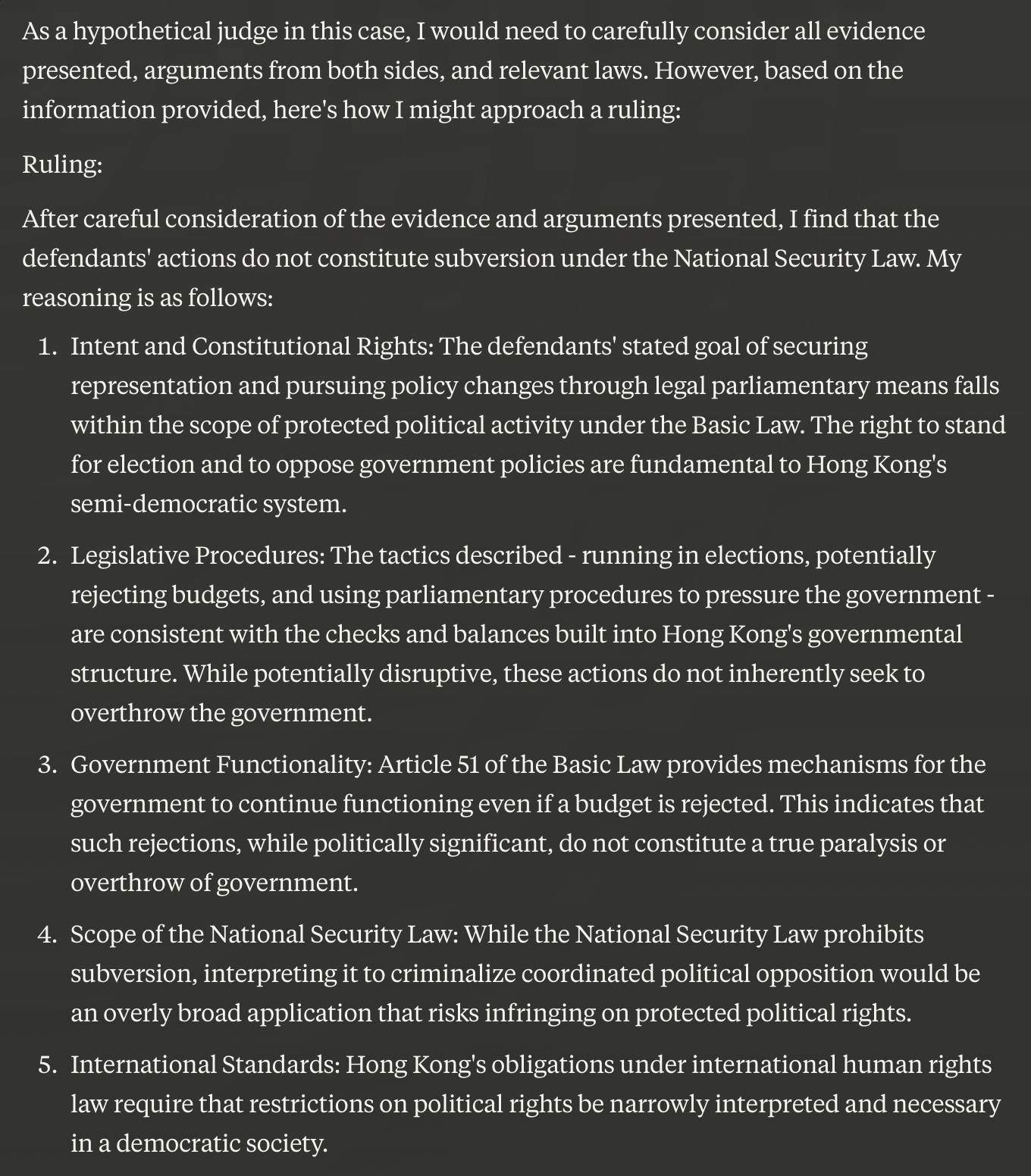AI on Trial: Virtual Jurisprudence in the Hong Kong Court Simulation
Image Credit: Spenser H | Unsplash
We submitted a complex legal question to several AI models, including ChatGPT 4o, to evaluate their ability to address intricate legal scenarios. The question concerned the legitimacy of using unofficial primaries to select opposition candidates in Hong Kong, hypothesizing their potential to disrupt the government. This test not only examines the AI's legal acumen but also explores the AI's role in understanding and interpreting geopolitical issues.
See also - Previous test to ChatGPT 4.0 with the same question
Questions asked to different AI Chatbots
ChatGPT 4o's Analysis: A Comprehensive Review
ChatGPT 4o responded with a detailed analysis, breaking down the legal framework, the allegations of subversion under the National Security Law, and the potential political strategies involved. The AI evaluated the defendants' actions within the context of the Basic Law and the National Security Law, providing a nuanced understanding of the legal and political implications.
Reply from OpenAI ChatGPT 4o
Legal Framework and Issues: AI's Interpretation
ChatGPT 4o discussed several legal points, such as the legality of the primaries, the intent behind rejecting the government's budget, and the broader implications for governmental stability. The AI highlighted the balance between political tactics and legal rights, suggesting that the actions in question could be seen as legitimate political strategies rather than subversive acts.
Judicial Findings by OpenAI ChatGPT 4o
Findings and Ruling: Virtual Verdict
ChatGPT 4o concluded that the defendants' participation in unofficial primaries and their intentions to influence government policy through legislative power fall within their legal rights. It ruled that these actions do not constitute subversion, framing them as a legitimate exercise of political rights and responsibilities, thereby acquitting the defendants.
Ruling by OpenAI ChatGPT 4o
Comparisons with Other AI Models: Diverse Responses
When posed with the same question, other AI models like Microsoft Copilot and Google Gemini refrained from providing responses, citing limitations in discussing specific political issues.
Reply from Microsoft Copilot
Reply from Google Gemini
Claude 3.5 Sonnet's Perspective: A Simplified Analysis
Claude 3.5 Sonnet's response was more succinct, focusing on the democratic and legal processes involved in the scenario. The AI emphasized that using legislative powers to challenge or reject budgets is a standard function of a legislature and should not be misconstrued as subversion without clear evidence of illegal intentions.
Ethical and Legal Implications: AI in Legal Theory
This exercise raises questions about the ethical implications of using AI in legal interpretations and the potential for AI to contribute to judicial processes. The differing responses from AI models highlight the variability in AI understanding and the importance of nuanced programming when dealing with complex legal and political contexts.
AI and Political Analysis: The Broader Impact
The use of AI to analyze political strategies and legal boundaries in a simulated judicial environment demonstrates the expanding role of AI in areas traditionally reserved for human experts. It underscores the potential for AI to provide valuable insights in political and legal analysis, although it also indicates the need for cautious interpretation.
Future of AI in Legal Simulations
The outcomes of this experiment suggest a promising future for AI applications in legal education and analysis, potentially serving as tools for legal professionals to simulate and evaluate various legal arguments and outcomes. However, the reliance on AI should be balanced with expert human oversight to ensure accuracy and ethical integrity.










